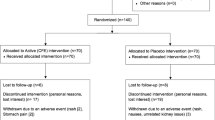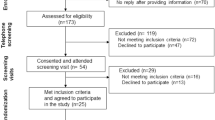Abstract
Purpose
Fenugreek seeds (Trigonella foenum-graecum L.) are an old herbal remedy used to treat metabolic and nutritive dysfunctions. They have been shown to modulate feeding behaviour in animals, but strong clinical data are lacking. The aim of this study was to investigate the effects of a repeated administration of a fenugreek seed extract on energy intake and eating behaviour in healthy human volunteers.
Methods
Twelve healthy male volunteers completed a double-blind randomized placebo-controlled three-period cross-over trial of two different doses of a fenugreek seed extract (588 and 1176 mg). The three 14-day treatment periods were separated by a 14-day washout period. The main endpoints were energy intake, assessed in volunteers under normal ambulatory and free-living conditions by a 3-day detailed dietary record and during a meal test, weight, fasting glucose level, insulin and lipid profile, visual analogue scale scores of appetite/satiety and blood glucose and insulin levels measured repeatedly after a standardized breakfast.
Results
Daily fat consumption was significantly decreased by the higher dose of fenugreek seed extract [3.73 vs. 4.51 MJ day−1, −17.3% vs. placebo, 95% confidence interval (CI) −1.51 to −0.05, n = 12, P = 0.038]. This specific reduction tended to lower the total energy intake (9.97 vs. 11.29 MJ day−1, −11.7% vs. placebo, 95% CI −2.91 to 0.26, n = 12, P = 0.094). No significant effect was observed on the other nutrients or other endpoints.
Conclusions
The repeated administration of a fenugreek seed extract specifically decreases dietary fat consumption in humans which, given the traditional use of the plant, constitutes a novel result.

Similar content being viewed by others
References
Sauvaire Y, Petit P, Baissac Y, Ribes G (2000) Chemistry and pharmacology of fenugreek. In: Mazza G, Oomah BD (eds) Herbs, botanicals and teas. Technomic, Lancaster, pp 107–129
Rguibi M, Belahsen R (2006) Body size preferences and sociocultural influences on attitudes towards obesity among Moroccan Sahraoui women. Body Image 3:395–400
Petit P, Sauvaire Y, Ponsin G, Manteghetti M, Fave A, Ribes G (1993) Effects of a fenugreek seed extract on feeding behaviour in the rat: metabolic-endocrine correlates. Pharmacol Biochem Behav 45:369–374
Petit PR, Sauvaire YD, Hillaire-Buys DM, Leconte OM, Baissac YG, Ponsin GR, Ribes GR (1995) Steroid saponins from fenugreek seeds: extraction, purification, and pharmacological investigation on feeding behavior and plasma cholesterol. Steroids 60:674–680
Udayasekharan Rao P, Sesikeran B, Srinivasa Rao P, Nadamuni Naidu A, Vikas RV, Ramachandran EP (1996) Short term nutritional and safety evaluation of fenugreek. Nutr Res 16:1495–1505
Handa T, Yamaguchi K, Sono Y, Yazawa K (2005) Effects of fenugreek seed extract in obese mice fed a high-fat diet. Biosci Biotechnol Biochem 69:1186–1188
Hill AJ, Magson LD, Blundell JE (1984) Hunger and palatability: tracking ratings of subjective experience before, during and after the consumption of preferred and less preferred food. Appetite 5:361–371
Raben A, Tagliabue A, Astrup A (1995) The reproducibility of subjective appetite scores. Br J Nutr 73:517–530
Smith BK, York DA, Bray GA (1999) Activation of hypothalamic serotonin receptors reduced intake of dietary fat and protein but not carbohydrate. Am J Physiol 277:R802–811
Goldfield GS, Lorello C, Doucet E (2007) Methylphenidate reduces energy intake and dietary fat intake in adults: a mechanism of reduced reinforcing value of food? Am J Clin Nutr 86:308–315
Sharma RD, Sarkar A, Hazra DK, Misra B, Singh JB, Maheshwari BB (1996) Toxicological evaluation of fenugreek seeds: a long term feeding experiment in diabetic patients. Phytotherapy Res 10:519–520
Acknowledgements
This study was sponsored by the University Hospital of Montpellier (UF7599) with the financial support of Laboratoires Legras (Cachan, France). We specially thank B Bories-Azeau (administrative assistant) for her extensive effort in recruiting volunteers and managing the study. This study was also successfully carried out thanks to the expert scientific, medical, biological and logistic assistance of R. Blanc, A. Bonardet, F. Michel, C. Montaudié, M.C. Picot and A.M. Puech-Cathala.
Author information
Authors and Affiliations
Corresponding author
Rights and permissions
About this article
Cite this article
Chevassus, H., Molinier, N., Costa, F. et al. A fenugreek seed extract selectively reduces spontaneous fat consumption in healthy volunteers. Eur J Clin Pharmacol 65, 1175–1178 (2009). https://doi.org/10.1007/s00228-009-0733-5
Received:
Accepted:
Published:
Issue Date:
DOI: https://doi.org/10.1007/s00228-009-0733-5




